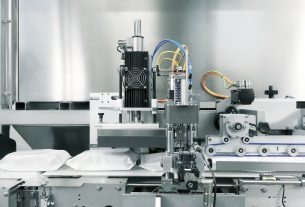Modern society is characterised by our reliance on convenience. We are all guilty of choosing convenience over the most sustainable option – from single-use disposable coffee cups to the polystyrene packaging and plastic bags used to keep takeaway food warm.
Over the past decade, however, the food and drink industry has been making some steps to implement greener packaging initiatives. This is sorely needed – in the UK alone, packaging makes up nearly 70 percent of our total plastic waste. 1. With supermarkets offering in-store opportunities for consumers to recycle soft plastic and films, and re-use and refill schemes popping up across the country, it is clear that the industry is trying to tackle the sheer volume of plastic we consume and dispose of every day.

Yet no matter how much effort is made to make the product ‘recyclable’ – so long as it is plastic, it can never be truly ‘sustainable’. The world’s plastic production, use and disposal contributes to around 1.8 billion tonnes of carbon emissions annually – that’s equivalent to 150 million double-decker buses.2
It is intrinsic to the molecular make up of plastic that it can only be mechanically recycled two or three times before its quality is too poor to be used again. In addition, each time plastic is recycled, virgin material is added to help “upgrade” its quality, so that the recycled product has a fighting chance in the market against new, durable, and fresh plastics goods.
In food and beverage applications, the situation is even more perilous as the contents tend to soil the packaging and further complicate the recycling process. Soft plastics, used for products such as bread bags and toilet roll wrap, account for the majority that is thrown away. This type of plastic is notoriously difficult to recycle, and Greenpeace research revealed that supermarket collections of these plastics often end up incinerated, exported to poorer countries, or in landfill, where they disintegrate, but remain chemically inert, for hundreds of years.3
For these thin plastic films, recycling or reuse is simply not a practical option. New, natural materials that can seamlessly replace many of the barrier properties are our best option to cut plastic production at source.
UK innovators are creating drop-in solutions which can be made and formed on the same production lines presently used for plastic, enabling brands to make the simple swap with no disruption. Unlike its principal competitors, the material Xampla is producing is plant-based and requires no chemical modification or ‘cross-linking’. This ensures it decomposes naturally, mirroring the behaviour of the plants from which it is made.
These natural materials can protect food, with the added advantage of being fully biodegradable, the material does not last forever – since nothing needs to be preserved in perpetuity. At the end of its life cycle, these materials act not as a plastic but more like a food. This means it can be collected and recycled with food waste and won’t leave behind any harmful microplastics if it does enter the Earth’s soil or seas.
The development of next-generation materials, like Xampla’s, is all part of the system change the food and drink industry will be a part of in the coming years. As EU regulation tightens the thumb screws on plastic, and consumers increasingly grapple with a newfound eco-consciousness, we should expect to see a downward trend in plastic production and a greater uptake in alternative materials to replace plastic – as well as new systems that allow consumers to reuse packaging rather than throw it away.
The early adopters of these technologies have the potential to transform the packaging industry, reshaping it towards sustainability whilst gaining support from consumers. There is no better time to switch than now and become a trailblazer toward a more sustainable, plastic-free future.
Stanley Mitchell is Head of Business Development of Cambridge-based Xampla, experts of drop-in high-performance natural materials that replace the most polluting plastics.




